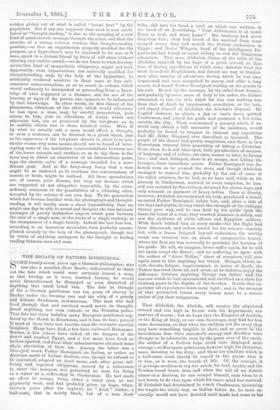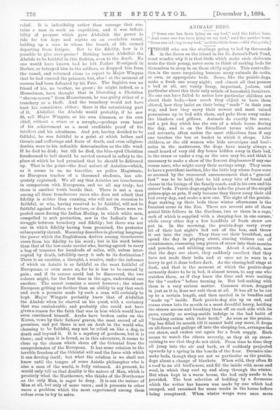THE ESCAPE OF FATHER ROSSIGNOLI.
and hideous Sondanese task mistress. The man who had lived through that and survived would never, he thought, dread anything, not even ridicule or the Prussian police. That fate has since befallen many European gentlemen cap- iured by the Mandi in Khartoum, and it has, we fear, proved to most of them little less terrible than the sarcastic novelist i'm'agined. Many have died, a few have embraced Mahomme- danism, a few others have risked all the dangers of the desert and reached Egypt, and a few more have lived on broken-spirited, and from their submissiveness obtained some slight alleviation of their loi. Among the latter was a
blue-eyed monk, Father Rossignoli, an , or rather an Austrian monk of Italian descent, who, though he refused to lie converted, adopted an Arab name, and, after great suf- fering and repeated whippings, earned by a reluctance to enter the mosques, was permitted to earn his living as a waiter at a coffee-shop in Omdurman. He had made no effort to escape, being either a timid man, or one physically weak, and had probably given up hope, when, thirteen years after his capture, an " Arab" visitor, a half-caste, that is, nearly black, but of a true Arab reading between man and man. where his first act was naturally to proclaim the heroism of his guide. He will, we imagine, never suffer again, for he will not again tempt the desert ; and no suffering, we agree with the author of " Abou Telfan," short of recapture, will ever again seem to him anything but trivial. Hunger, thirst, in-
SOME twenty-seven years ago a German philosopher, who suit, threats, fatigue, imprisonment, or terror of death, the was also a novelist, Herr Raabe, endeavoured to think Father has tried them all, and must, as he endures, enjoy the out the fate which would most certainly anneal a man, difference between anything Europe can inflict and the so that having, as it were, touched bottom, he would horrors which he had encountered and survived as a slave for never thenceforward be dismayed or even disturbed at thirteen years in the depths of the Soudan. Beside that ex- anything that could befall him. The fate he thought perience all experiences must seem light ; and in the memory of for a German gentleman was ten years of davery in of that protracted lesson every lesson must be a source Darfur under the burning sun and the whip of a greedy rather of joy than resignation.
That Abdullah, the Ababde, will receive the stipulated reward and rise high in favour with his department, are matters of course ; but we hope that the Emperor of Austria, or the King of Italy, or our own Sovereign, may find for him some decoration, so that when his children tell the story they may have something tangible to show, and so prove to the incredulous that their ancestor's energy and devotion were thought to be admirable even by the great ones of the earth. No soldier of a forlorn hope could have displayed more courage; no European gentleman, however high his character, more devotion to his duty ; and those are qualities which in a half-caste Arab should be repaid in the praise that is to him, as it were, the breath of life. Of the courage, it is perhaps needless to say too much, for both Arabia and the Soudan breed brave men, and when the will of an Asiatic closes on a decision, he can compel himself, even when he is not brave, to do that upon which his inner mind has resolved. If Abdullah had determined to r each Omdurman, measuring his length the whole way, as Indian fakirs do, he most as- suredly would not have desisted until death had come to his relief. It is inflexibility rather than courage that sus- tains a man in each an expedition, and it was inflexi- bility of purpose which gave Abdullah the power to ride for ten days and nights on an overladen camel, holding up a man in whom the breath of life seemed departing from fatigue. But to the fidelity, how is it possible to give over-praise P Nothing bound Abdullah the Ababde to be faithful in this fashion, even to the death. No one would have known had ho left Father Rossignoli in Berber, or betrayed him to the soldiers, or dropped him from the camel, and returned alone to report to Major Wingate that he had rescued the prisoner, but, alas ! at the moment of success had been defeated by his Fate. The fugitive was no friend of his, no brother, no guest; he might indeed, as a Mussulman, have thought that in liberating a Christian 41 shaven-crown " from Mussulmans, he was guilty either of a treachery or a theft. And the treachery would not have hurt his conscience, either; there is the astonishing part of it. Abdullah the Ababde would probably, if he saw fit, sell Major Wingate, or his own kinsman, or his own chief, without a wince or a soruple,—perhaps even boast of his achievement as a most creditable proof of his intellect and his adroitness. And yet, having decided to be faithful, he was faithful to a point at which bribes and threats and sufferings and fears of death, and even religious doubts, were to his inflexible determination as the idle wind. If he died he died ; but till he died, the blue-eyed Christian foredoomed to hell should be carried onward in safety to the place at which be had promised that he should be delivered up. That is the point—the dual nature of Asiatics—which, as it seems to us, no traveller, no police Magistrate, no European teacher of a thousand students, has ade- quately explained. We all say that Asiatics are treacherous in comparison with Europeans, and we all say truly; but there is another truth beside that. There is not a man among all these treacherous races who does not admit that fidelity is nobler than cunning, who will not on occasion be faithful, or who, having resolved to be faithful, will not be faithful against bribes, or torture, or death. There were re- peated cases during the Indian Mutiny, in which white men, compelled to seek protection, saw in the Indian's face a struggle between treachery and fidelity; but there was not one in which fidelity having been promised, the protector -subsequently shrank. Macaulay describes in glowing language the power which the Englishman derives among treacherous races from his fidelity to his word ; but is his word better than that of the low-caste carrier who, having agreed to carry a bag of treasure for hundreds of miles, will, unless inter- rupted by death, infallibly carry it safe to its destination P There is an emotion, a thought, a resolve, under the influence of which an Asiatic is as faithful as the most faithful of Europeans, or even more so, for he is less to be coerced by pain ; and if its source could but be discovered, the two colours might, for the first time in the ages, understand one another. The secret remains a secret however ; the wisest European getting no farther than an ability to say that such and such a promise made by such a man will certainly be kept. Major Wingate probably knew that of Abdullah the Ababde when he started on his quest, with a certainty that was unshakeable, and probably also could not have given a reason for the faith that was in him which would have even convinced himself. Arabs have broken oaths on the Koran, vows by their fathers' graves, the most sacred of all promises, and yet there is not an Arab in the world who, choosing to be faithful, may not be relied on like a dog, to death and beyond it. It is a mystery of goodness, but it is there ; and when it is found, as in this adventure, it seems to close up the chasm which shuts off the Oriental from the comprehension of the European. It has some relation to the terrible freedom of the Oriental will and the force with which it can develop itself; but what the relation is we shall not know until the tongue of some Asiatic philosopher who is also a man of the world, is fully unloosed. At present, be would only tell us that duality is the nature of Man, which is precisely what the Northerner, who thinks of the Northerner as the only Man, is eager to deny. It is not the nature of Man at all, but only of some races ; and it presents to other races a problem which the most experienced among them refuse even to try to solve.



















































 Previous page
Previous page